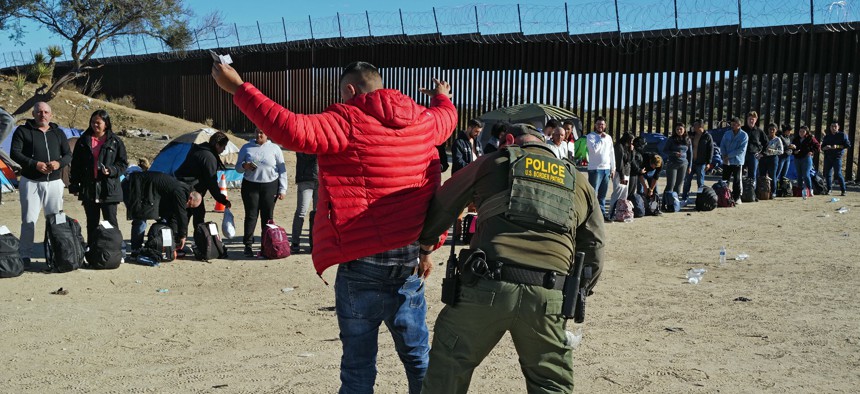
Migrants attempting to cross in to the U.S. from Mexico are detained by U.S. Customs and Border Protection at the border Nov. 28, 2023 in Jacumba Hot Springs, California. Nick Ut / Getty Images
DHS warns it’s running low on funds and borrowing personnel to manage border
As the number of migrants arriving at the border climbs, federal personnel are becoming overwhelmed.
The Biden administration is warning that its resources are being stretched thin as a record number of migrants are arriving at the U.S.-Mexico border and is asking Congress to provide more funding to address the situation.
Customs and Border Protection is once again reassigning officers from its field offices to assist with Border Patrol and tapping personnel from other Homeland Security Department components, and other agencies altogether, to boost efforts to process immigrants.
Border Patrol is increasingly responding to large groups that smugglers are pushing to the border en masse intentionally aimed at overwhelming agents and officers there, an agency official said, who noted CBP is equipped to handle about half the volume of encounters to which it is currently responding.
In addition to moving Office of Field Operations Staff and personnel from other components, DHS has asked the Justice Department’s Bureau of Prisons to meet transportation needs along the southwest border. It has also closed crossings at a number of locations, including most recently two international railways.
“CBP is currently funded through a continuing resolution,” the official said. “We can't spend more money than we have and we are pulling all the levers we can to provide additional support.”
Troy Miller, the current acting head of CBP, said his agency is implementing new measures to impose consequences on nefarious groups and transportation companies that are moving migrants in dangerous ways and places, but it and its federal agency partners “need additional funding from Congress” to carry out its duties.
“The encounter levels we are currently seeing across the southwest border are presenting a serious challenge to the men and women of CBP,” Miller said. “To meet this challenge, we are using all available resources to ensure the safety and security of our agents and officers, and the migrants who are often misled and victimized by the transnational criminal organizations.”
The current situation marks just the latest instance in recent years that DHS has rearranged resources to address swings in migration patterns, as well as other emergencies such as hurricane response and refugee processing. In 2021, President Biden tapped the Federal Emergency Management Agency to address a record increase in migrant children at the border. FEMA, CBP, Federal Protective Service, Immigration and Customs Enforcement and other DHS employees deployed through the department's Volunteer Force staffed shelters, provided security and offered other support.
The administration subsequently asked for volunteers across government to help an overwhelmed DHS and Health and Human Services Department in processing the children. Under President Trump in 2019, CBP reassigned thousands of customs officers from ports of entry to assist Border Patrol staff during a migration upswing. Just last year, DHS reassigned Federal Air Marshals to the border to help process migrant arrivals.
Miller and CBP made their pitch as the White House is engaging with Senate Republicans on a plan to tighten immigration policy and ramp up border security, though the two sides have yet to reach a deal. They had hoped to strike an agreement—as part of a package that would provide tens of billions of dollars in aid to Ukraine, Israel, Taiwan and other allies—before Congress recessed for the year, but were unable to do so and lawmakers have all left Washington until January.
As part of the deal, the Biden administration is seeking $13.6 billion to hire nearly 6,000 immigration and border security-related employees at DHS and the Justice Department. Republicans have insisted that any additional international aid be paired with more restrictive immigration policy changes.
Key negotiators have expressed some optimism that the various factions are making progress and could reach a bipartisan agreement in the new year. Areas of continued contention include reforms to the asylum process, limitations on legal immigration pathways such as parole and increased capacity for DHS officials to immediately turn away migrants as they did throughout the pandemic. Even if they strike a deal, passage could prove difficult as members of both parties have denounced the preliminary parameters for being either overly restrictive or insufficiently severe.
A CBP official said the agency is working with partners in Mexico to investigate travel companies with large buses that take migrants to “random sports on the border.” The agency has growing concern about the number of migrants using rail to get to the border, noting it leads to death, dismemberment and an overwhelmed Border Patrol. The official added CBP has generally been able to accomplish its goal of each day moving in large groups it encounters overnight.







